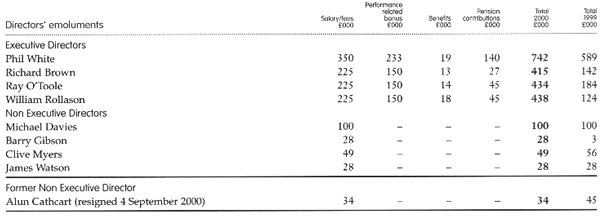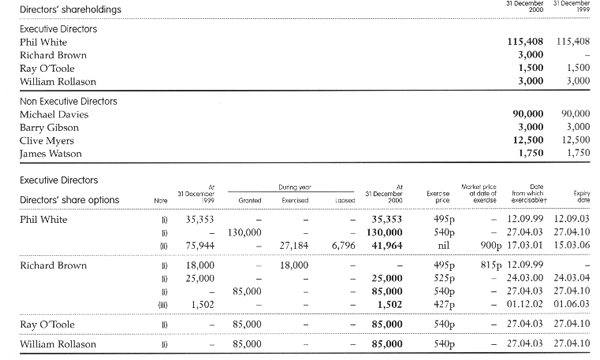The Remuneration and Nomination Committee ("the Committee"), comprised solely of the Non Executive Directors, is responsible for determining the remuneration and conditions of employment of the Chairman and Executive Directors. The fees of the Non Executive Directors (other than the Chairman) are set by the Board as a whole.
Policy
In determining appropriate levels of remuneration for the Executive Directors,
the Committee aims to provide packages that are competitive in the marketplace
and will attract and retain high quality executives capable of achieving
the Group's objectives. To this end, the Committee seeks advice each year
from a firm of executive remuneration consultants, who are instructed
to review the existing remuneration of all the Directors, making comparisons
with peer companies of similar size and complexity. Proposals for the
forthcoming year are then discussed in the light of the Group's growth
prospects. The Committee is kept informed by the Chief Executive of the
salary levels of all senior executives employed by the Group.
Individual
components of remuneration
A detailed breakdown of Directors' remuneration appears on pages 41 to
43. In summary, the components are:
(i) Basic salary: the salary of individual Executive Directors is reviewed at 1 January each year. Account is taken of the performance of the individual concerned, together with any change in responsibilities that may have occurred and, as stated above, the rates for similar roles in comparable companies.
(ii) Performance-related bonus: a discretionary bonus scheme for the Executive Directors was first introduced in 1993. Payments are conditional on the achievement of year on year growth in earnings per share, on a graduated basis. For 2000, the Committee set the maximum bonus payable at 75% of basic salary.
(iii) Other benefits: Executive Directors receive a fully expensed car and private health insurance.
(iv) Pensions: under the terms of their service agreements, Executive Directors are entitled to become members of one of the Group pension schemes or, if preferred, to receive payment of a fixed percentage of salary into an approved personal pension scheme.
(v) Share option and long term incentive arrangements: the Committee has made awards to Executive Directors under two schemes. Details of the awards are shown under the heading "Directors' share options" on page 42.
The two schemes are:
(a) Executive Share Option Scheme: the Company operates an executive share
option scheme for Directors and other senior management. Options granted
under this scheme to Executive Directors up until 1999 are subject to
performance criteria of growth in the Company's earnings per share of
RPI+6% over the three year period from the date of grant.
Following a review of the Company's long term incentive arrangements in conjunction with external consultants, a new incentive policy was proposed and approved by shareholders at last year's Annual General Meeting. Shares granted to Executive Directors under the Company's Executive Share Option Scheme will be phased up to an annual maximum of twice basic salary. Each grant will become exercisable after three years, subject to a sliding scale of compound annual growth in earnings per share. Each option is subject to a fixed three year performance period and will lapse at the end of that period if the performance conditions are not fulfilled.
Options become exercisable in full where compound annual growth in earnings per share is 10% in excess of the growth in RPI over the same period. No part of the option is exercisable if the compound annual growth in earnings per share is 2% or less in excess of the growth in RPI. Between these two points an option is exercisable on a straight line basis.
Executive Directors may hold options over shares having a market value (measured at the date of grant of an option) not exceeding eight times the individual's salary. To the extent that any option on its grant would cause an individual to exceed the existing limit of four times salary, the option will be satisfied by the transfer of shares from the Company's Employee Benefit Trust, rather than by the issue of new shares.
(b) Long Term Share Incentive Scheme: shareholder approval was obtained at the 1997 Annual General Meeting for the introduction of a Long Term Share Incentive Scheme. In normal circumstances, shares may vest under this scheme no earlier than three years from the date of award. The number of shares which may vest is based on the total return to shareholders measured using share price and dividends over a three year performance period relative to the performance of a defined comparator group. As a result of the introduction of the long term incentive arrangement, outlined above, no further awards will be made, for the time being, to Directors under the Long Term Share Incentive Scheme.
In order to align the interests of the Directors more closely with the shareholders, the Remuneration Committee has also determined that the Executive Directors should build up a share fund equal to at least one year's salary over a period of six to eight years.
Directors'
service contracts
No Executive Director has a service contract with the Company terminable
on more than 12 months' notice. The Non Executive
Directors do not have service contracts with the Company.
Outside
appointments
Under the terms of their service agreements, Board approval is required
before any external appointment may be accepted by an Executive Director.
Directors'
remuneration

Notes
(i) The total emoluments of the highest paid Director for the year ended
31 December 2000 (including salary, bonus and gains on exercise of options,
but excluding pension contributions) were £847,571. In the previous
year the emoluments of the highest paid Director were £608,247.
(ii) Phil White, Ray O'Toole and William Rollason participate in defined
contribution pension schemes.
The
following information relates to Richard Brown who participates in a defined
benefit scheme:

Directors'
interests and transactions
The beneficial interests of the Directors in office as at 31 December
2000 are shown below:

In the case of awards under the Long Term Share
Incentive Scheme, this date is the earliest on which, under normal circumstances,
shares awarded under the Scheme may vest.
Notes
(i)Options granted under the NEG Executive Share Option Schemes.
(ii)Awards under the Long Term Share Incentive Scheme: shares awarded
under the Long Term Share Incentive Scheme are held in the Employee Benefit
Trust and may be transferred to participants in the Scheme at the discretion
of the Trustees, subject to certain performance criteria being met. In
normal circumstances, no award under this scheme may vest until
three years after the date of the award.
(iii) Options granted under the NEG Savings Related Share Option Scheme.
In addition to their individual interests in shares the Executive Directors were, for Companies Act purposes, regarded as interested in the 1,075,484 shares held at 15 March 2001 by the National Express Group QUEST ("QUEST"), established for satisfying exercises under the Group's Savings Related Share Option Scheme. All employees (including Executive Directors) are potential beneficiaries under this Trust.
David Ross and Tim Stevenson were appointed Directors of the Company on 1 February 2001 and as at this date held 574 and no shares respectively. No other change occurred in any of the interests held by Directors in office between 31 December 2000 and 15 March 2001. The Register of Directors' Interests maintained by the Company contains full details of the Directors' holdings of shares and options over shares in the Company. The aggregate difference between the exercise prices and the mid-market prices on the dates of exercise by Directors of all share options during the year was £302,256.
The mid-market price of the Company's ordinary shares at 31 December 2000 was 723p (1999: 730p) and the range during the year ended 31 December 2000 was 485.5p to 905p.